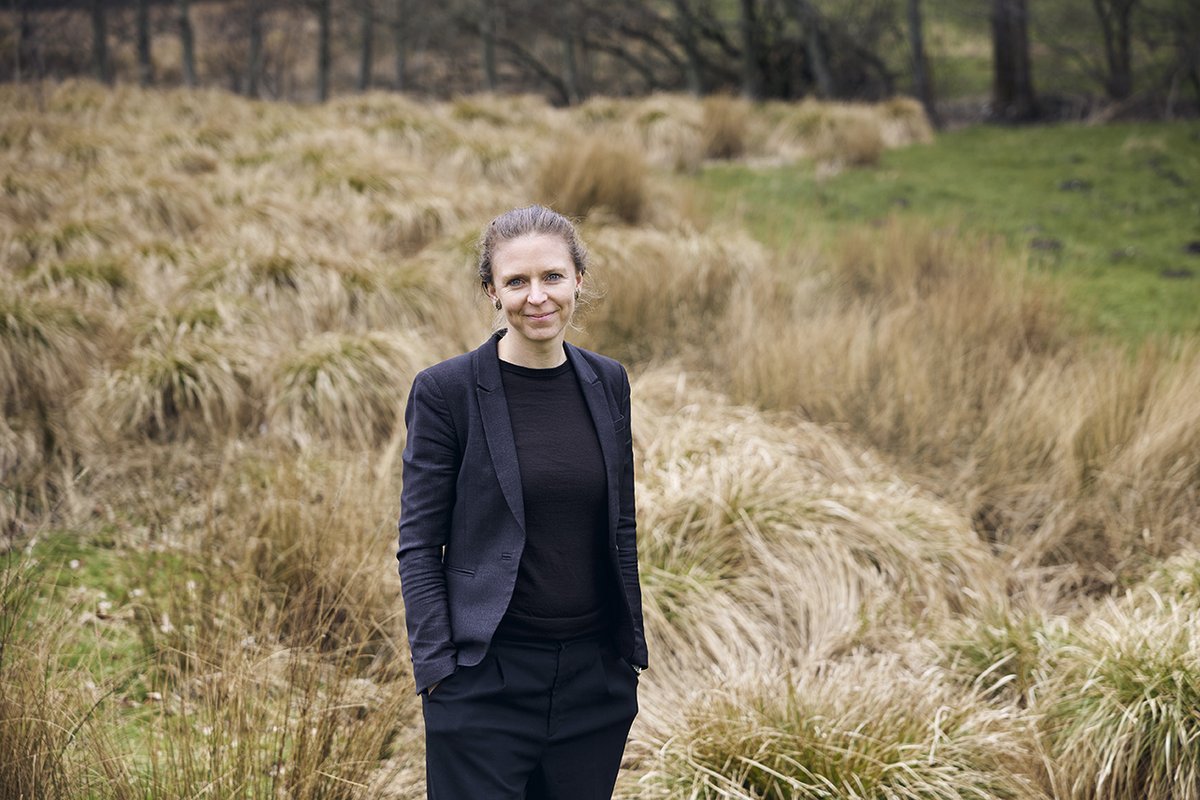Professor Mette Løvschal receives the Victor Albeck Award
By Ida Hammerich Nielson
Professor Mette Løvschal digs through millennia when she explores the history of heathlands and grasslands. Her research does not stop at the past, though. It can also tell us something about anthropogenic landscapes today – from East Africa to Eastern Jutland. She receives the 2022 Victor Albeck Award for her innovative research into the relation between man and nature.
Outside the village of Sejs in Central Jutland you will find Sindbjerg and Stoubjerg. The area is home to a vegetation once found in large parts of Europe, but which is becoming more and more rare today.
The heath. There is little to disturb the view of the sky and horizon. The heather growing on the heath gives it its characteristic purple colour, and flocks of birds take off and land on the ground, which is teeming with life. You may see an adder, but you are unlikely to be disturbed by people.
You would have been, though, if you had visited the place 4,000 years ago. Stone Age men with heavy stone axes would have been busy felling trees and burning the underbrush to create grasslands for sheep and cattle, thus creating the heath.
This is where Mette Løvschal’s research begins. Humans have to a large extent shaped the landscape we see today. Nature and culture are inseparable. Comparing satellite images, excavation results, pollen analyses and much more she has been able to trace the history and evolution of the heath back thousands of years.
“This is an extremely unstable landscape. Without human influence, the heath would soon be overtaken by woods. It takes a lot of people, who have to work together and i.a. burn the underbrush every seven to 10 years. Hence, human influence plays a vital role in the history and survival of the heath,” she explains.
Mette Løvschal
- Professor of Archaeology.
- She has trained as an archaeologist, but has also studied anthropology, cognitive semiotics and architecture.
- In 2015, she received the Aarhus University Research Foundation PhD Prize for a doctoral project on the emergence of landscape boundaries.
- In 2019, she received an ERC Starting Grant for a project titled ANTHEA – Anthropogenic Heathlands: The Social Organization of Super-Resilient Past Human Ecosystems.
- Her work has been published in i.a. PNAS, Nature (Scientific Reports), Current Anthropology and World Archaeology.
- She is employed by Aarhus University and Moesgaard Museum and works towards strengthening collaborations between researchers and Danish museums in general, i.a. as a member of the Association of Danish Museums’ archaeological and research committees.
Gnus and zebras are unable to pass
Humans’ relation to nature runs like a red thread through Mette Løvschal’s research, which is used in various parts of the world, including East Africa. For hundreds of years, the local population has used the savannah as large, shared commons for coordinated grazing of life stock. Today, more and more areas are being fenced in. Together with a large team of researchers from fields such as biology and anthropology, Mette Løvschal has documented the consequences of the ongoing fencing process:
“Fences prevent the large-scale migration of e.g. gnus, zebras and gazelles, and thus the ecosystem is suffering and may soon collapse. But the fencing process also has huge social and cultural consequences for the local population who are suddenly unable to access water resources during draughts. Similar processes – extensive fencing of land and the collapse of traditional ways of life and ecosystems – are seen throughout the world today,” says Mette Løvschal.
Her research is used locally as a planning tool to prevent fencing and thus protect migrations.
Nature and culture are closely connected
Mette Løvschal receives the Victor Albeck Award for her ground-breaking, interdisciplinary research, which brings new perspectives to the debate on land use, nature conservation and the green transition in Denmark, among other places, where the entire landscape has to some extent been shaped by humans.
“The current state of our woods, meadows, fields and heaths is the result of thousands of years of complex interaction between humans, animals and landscape changes. I do not think of humans and nature as opposites. I believe allowing humans and cultural landscapes a say and a place in the green transition would strengthen the process,” she says.
Today, heathlands are threatened habitats, and there is no saying how much heathland will be left in Denmark 10 years from now. But the heath has an effect on us:
“Most of us live in towns and go for walks in the woods where there is always something to obstruct our view of the sky and horizon. On the heath, however, there is nothing to stop the eye. The vast landscape will give you not only a sense of spatial infinity, but also a sense of timely continuity. It puts me and my life into context, so to speak. I can see myself as part of a story – the long history of humans and the landscape,” says Mette Løvschal.
Facts
Victor Albeck Award
The Victor Albeck Award of DKK 100,000 is awarded to young talented researchers affiliated with Aarhus University, who are doing scientific work and have presented one or more significant results which promise well for the future. It is awarded at a ceremony in May together with the Aarhus University Research Foundation PhD Prizes.
